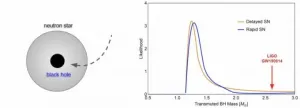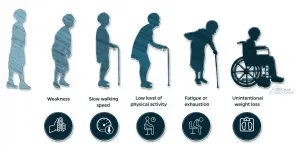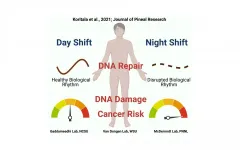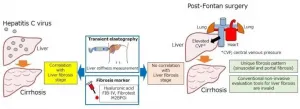Researchers believe that manipulating bowel cancers based on their 'immune landscape' could unlock new ways to treat resistant tumours.
Cancers can evolve resistance to radiotherapy just as they do with drugs.
The new study found that profiling the immune landscape of cancers before therapy could identify patients who are likely to respond to radiotherapy off the bat, and others who might benefit from priming of their tumour with immunotherapy.
Scientists at The Institute of Cancer Research, London, in collaboration with the University of Leeds and The Francis Crick Institute, studied inflammation in bowel tumour samples taken before and after radiotherapy from 53 patients. They aimed to understand how tumour immune activity before and after radiotherapy differs between patients who respond well and those who respond poorly to treatment.
The study is published in the Journal for ImmunoTherapy of Cancer and was supported by the NIHR Biomedical Research Centre at The Royal Marsden NHS Foundation Trust and The Institute of Cancer Research (ICR), and the Medical Research Council.
The team showed that the effectiveness of radiotherapy partly depends on the level of inflammation within tumours before and after treatment.
In the study, patients who showed a poor response to radiotherapy - with no substantial falls in numbers of tumour cells - started with chronically inflamed tumours, with high levels of activity in 40 immune genes. The level of inflammation within their tumours showed minimal changes following radiotherapy.
In contrast, good responders - who saw a marked drop in the number of tumour cells during radiotherapy - started with a relatively low inflammation tumour landscape which revved up following treatment. Here, there was a significant increase in the activity of 198 immune genes including genes representing immune cells that can directly kill tumour cells.
Together, the findings show that carefully timing a combination of immunotherapy and radiotherapy, based on an assessment of the cancer's immune landscape, could provide a way forward for treating resistant cancers.
Although the study was carried out specifically in bowel cancer the researchers believe the findings could be relevant for other types of the disease too, particularly for cancers where surgery is not an option and radiotherapy is particularly important.
Increasing evidence shows that radiotherapy not only works by causing DNA damage and cell death in cancer cells but also in potentially a similar way to a vaccine - priming the immune system to recognise tumour cells and ramp up an immune response to attack them.
This work is part of growing activity at The Institute of Cancer Research (ICR) and in radiotherapy and immunology which includes the RadNet radiotherapy research network, in collaboration with The Royal Marsden.
Study leader Dr Anguraj Sadanandam, Leader of the Systems and Precision Cancer Medicine Team at The Institute of Cancer Research, London, said:
"Radiotherapy has revolutionised cancer treatment and is the most effective way of curing cancer other than surgery.
"Our study has shown that the immune landscape and levels of inflammation within cancers is crucial to determining how they respond to radiotherapy. It suggests that combining radiotherapy with immunotherapy could prove a highly potent mixture - improving our ability to eliminate hard-to-treat cancers further still.
"Now we want to improve our understanding of how to combine and sequence radiotherapy and immunotherapy together to maximise the treatment response for the individual biology of each patient."
Study co-author Dr Anna Wilkins, Clinical Research Fellow in the Clinical Trials and Statistics Unit at The Institute of Cancer Research, London, now at The Francis Crick Institute, said:
"Radiotherapy is an important curative treatment option for many patients with cancer. We are starting to understand how the immune response is important for radiotherapy to work most effectively.
"Our study suggests that by targeting specific non-cancer cells that block this immune response we can further improve radiotherapy responses in patients."
Dr Nick West, Clinical Academic Fellow at the University of Leeds and Honorary Consultant in Gastrointestinal Pathology, said:
"Radiotherapy is commonly used in patients with rectal cancer and there are currently no validated biomarkers that reliably predict how well the cancer will respond. Patients who do not respond well to radiotherapy may still experience significant side effects despite no clinical benefit.
"This study suggests that we can potentially improve the response in these patients through modulation of the immune system, which is a very exciting development. The study also showed that a novel technique developed at the University of Leeds, tumour cell density, can be used to objectively measure the degree of tumour response to radiotherapy."
Professor Paul Workman, Chief Executive of The Institute of Cancer Research, London, said:
"This fascinating study adds to the evidence that the effectiveness of radiotherapy is closely intertwined with the involvement of the immune system. It's now clear that the radiotherapy response in cancer cells and surrounding tissues can empower a patient's own immune system to recognise and destroy their tumour.
"But radiotherapy requires a healthy immune response, and the new research suggests we might need to tune that response through immunotherapy. It could provide a foundation for future trials to test new combinations of drugs, including immunotherapies, alongside radiotherapy."
INFORMATION:
Notes to editors:
For more information please contact Julia Bakker in the ICR press office on 02071535396 or julia.bakker@icr.ac.uk. For enquiries out of hours, please call 07595 963 613.
The Institute of Cancer Research, London, is one of the world's most influential cancer research organisations.
Scientists and clinicians at The Institute of Cancer Research (ICR) are working every day to make a real impact on cancer patients' lives. Through its unique partnership with The Royal Marsden NHS Foundation Trust and 'bench-to-bedside' approach, the ICR is able to create and deliver results in a way that other institutions cannot. Together the two organisations are rated in the top centres for cancer research and treatment globally.
The ICR has an outstanding record of achievement dating back more than 100 years. It provided the first convincing evidence that DNA damage is the basic cause of cancer, laying the foundation for the now universally accepted idea that cancer is a genetic disease. Today it is a world leader at identifying cancer-related genes and discovering new targeted drugs for personalised cancer treatment. A college of the University of London, the ICR is the UK's top-ranked academic institution for research quality, and provides postgraduate higher education of international distinction. It has charitable status and relies on support from partner organisations, charities and the general public.
The ICR's mission is to make the discoveries that defeat cancer. For more information visit ICR.ac.uk




